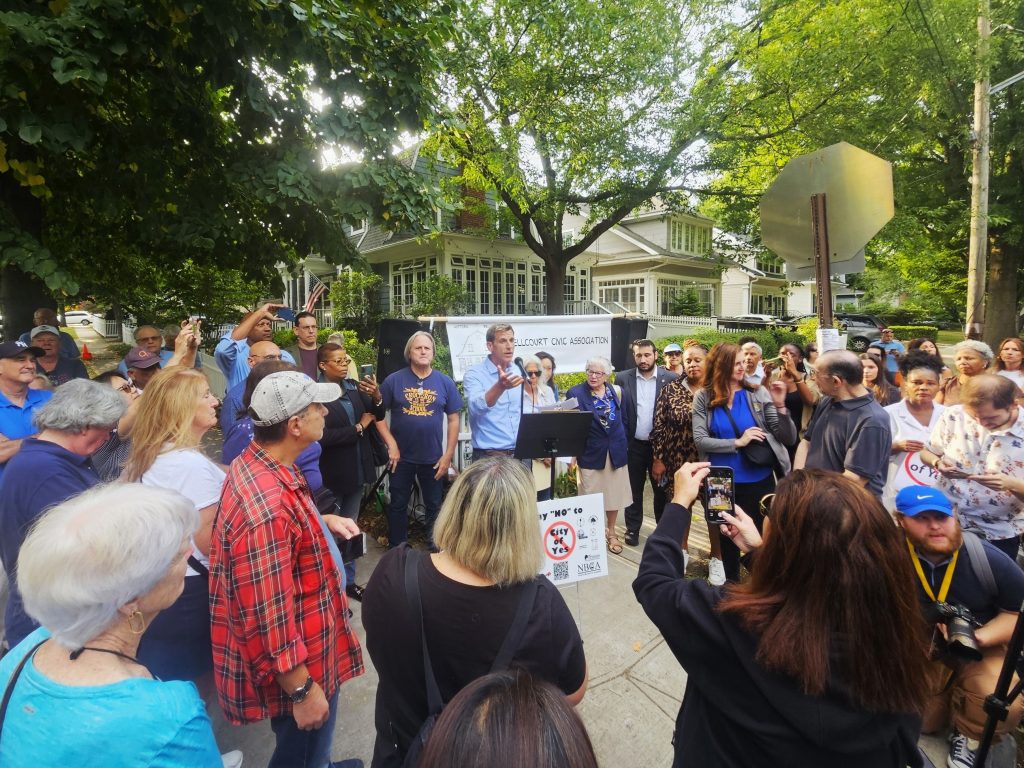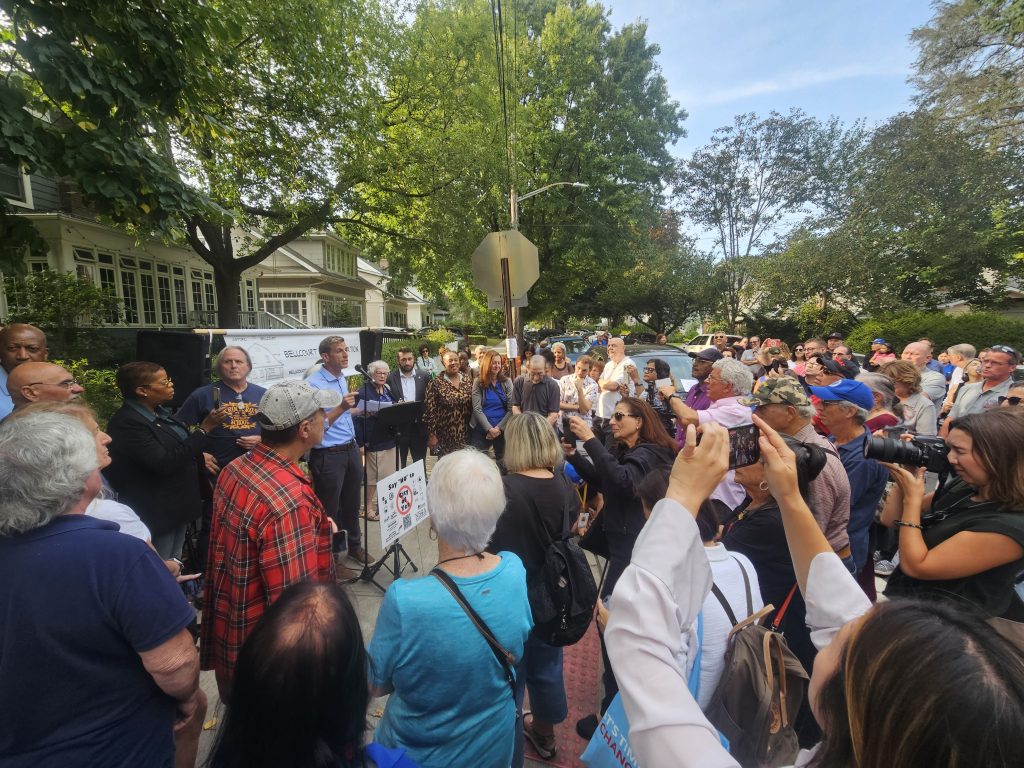
Courtesy Edward C. Braunstein’s Office
State Assemblyman Edward C. Braunstein and local officials rallied in Bayside to oppose Mayor Eric Adams’ City of Yes housing proposal.
By MOHAMED FARGHALY
mfarghaly@queensledger.com
State Assemblyman Edward C. Braunstein (D-Bayside) gathered local elected officials, civic leaders, and homeowners on Sept 16 to voice opposition to Mayor Eric Adams’ City of Yes housing proposal. The event took place at 212th Street and 38th Avenue in Bayside, a site within one of the proposed Transit-Oriented Development zones.
Braunstein was joined by Senator Toby Ann Stavisky, Assembly Members Sam Berger, Nily Rozic, Alicia Hyndman, and David Weprin, as well as Councilmembers Vickie Paladino and Linda Lee, among others. Over recent months, residents of Eastern Queens have raised concerns about the Mayor’s plan, which they argue threatens low-density neighborhoods and could exacerbate strains on local services and infrastructure.
“By all accounts, the Mayor and City Council are moving forward with the ‘City of Yes’ housing plan, despite significant opposition throughout the city, including Eastern Queens,” said Assemblyman Edward Braunstein. “The Mayor is framing the proposal as a modest change, requiring ‘a little more housing in every neighborhood.’ The Transit-Oriented Development and Accessory Dwelling Unit proposals are anything but modest, and would significantly increase density, straining our infrastructure and exacerbating traffic and parking challenges. Today, the Eastern Queens community has come together to call on the Mayor to abandon this misguided policy.”
“As a nation, we are experiencing a housing crisis and New York City is not immune to this challenge,” said Congresswoman Grace Meng. “While I agree that there is an urgent need to expand affordable housing, we cannot do this without the input of Queens residents. In my Congressional District, many have expressed concerns about the City of Yes including constituents and civic groups, as well as community boards – the majority of those in my district have voted against it. Many fear that alterations to long-standing zoning laws would give developers more power in changing the landscape of the neighborhoods than the families who live there. I have also heard concerns about the negative impact the plan would have on our local infrastructure including parking, transportation, schools, green space, sewer systems, city services, and more. There is no one-size-fits-all approach to managing the housing crisis across our city and we need solutions that will allow input from City Council Members and local elected officials to address the unique needs of each community. New York is not a one size fits all city; solutions should not be either.”
“I am sorry I cannot be with you today, but I want to be clear – I stand with the communities of Northeast Queens, and I do not support the City of Yes proposal,” said Congressman Tom Suozzi. “While I am a strong advocate for building all types of housing, especially affordable housing, and supporting the growth of small businesses, which are the lifeblood of New York, it must make sense for the affected neighborhoods. The Community Boards in Northeast Queens concerns about accessory dwelling units (ADUs), and the potential strain on infrastructure, such as schools, public transport, sanitation, parking, policing, and emergency services, all of which would need to be effectively equipped to handle increased demand, are legitimate concerns. For those reasons, I will not support the City of Yes proposal. Instead of a “one size fits all” plan, the city should craft a plan with the local community boards that makes sense for their neighborhoods.”
“While well intended the ‘City of Yes’ proposal misses the mark,” said Senator Toby Ann Stavisky. “If enacted, this ‘one size fits all’ approach to housing will destroy some of Queens’ most stable and flourishing communities. Transit Oriented Developments will saturate neighborhoods like the one we are in today with high density housing. Our sewer system is already overburdened by ever-increasing torrential rain events. Accessory Dwelling Units, such as basement apartments, have proven to be unsafe living quarters. Parking, which is already a problem in most areas, will worsen exponentially with the elimination of parking mandates and the conversion of garages to living spaces. We simply do not have the infrastructure to support these proposals. We need a more creative plan that reflects the unique needs of specific communities.”

Courtesy Edward C. Braunstein’s Office
The officials emphasize the importance of community input in housing decisions.
“Too often we see consequential policies put forth that aim to drastically change communities without heeding local feedback,” said Assemblyman Sam Berger. “The ‘City of Yes’ seeks to remove zoning laws that were put in place for a reason. There needs to be an understanding of what our infrastructure can and cannot handle – an understanding that comes from the very community input being ignored.”
“The City of Yes initiative, particularly its proposals for Transit-Oriented Development (TOD) and Accessory Dwelling Units (ADUs), presents a grave threat to the character and livability of our neighborhoods,” said Assemblywoman Alicia Hyndman. “The mayor frames these changes as modest, but they represent a significant increase in density that will strain already overburdened infrastructure. By removing parking mandates and legalizing ADUs, we are poised to see an exponential rise in congestion and safety risks, especially in transit-starved areas. Neighborhoods like ours, built around single-family homes, simply cannot accommodate the scale of development the City of Yes envisions without damaging the quality of life for long-standing residents.”
“Queens is confronting distinct challenges with the City of Yes proposal, particularly regarding its transit-oriented development zones, removal of parking mandates, and legalization of accessory dwelling units,” said Assemblywoman Nily Rozic. “Unlike other boroughs, Queens has a higher concentration of single-family homes and less developed transit infrastructure. The proposed increase in density and reduction in parking requirements could put additional strain on our already limited resources and significantly affect our neighborhoods. As we work towards improving our housing issues, it is crucial that we tailor these changes to meet Queens’ specific needs and prioritize the quality of life for all residents.”
“The City of Yes for Housing Opportunity poses a direct threat to the neighborhoods in Northeast Queens,” said Council Member Vickie Paladino. “Between transit oriented development, removal of parking restrictions, and legalizing of accessory dwelling units, we are in danger of losing the neighborhoods we’ve called home for decades. People choose to live in these neighborhoods for a reason, and the city must respect that choice. Instead, residents are being told their choices aren’t valid, and must sacrifice their lifestyle and investment for the ‘greater good’. Unacceptable. I’m glad to see my colleagues in State Government helping to oppose the City of Yes. I hope to see the City Council recognize the disastrous effects of these proposals, and rightfully oppose them once and for all. Freedom means the freedom to live how you choose, not to have your neighborhood destroyed by bureaucrats.”
“As the City of Yes for Housing Opportunity is currently proposed, our communities are presented with a package of reforms that will significantly impact our neighborhoods,” said Council Member Linda Lee. “New York City is in the midst of a housing crisis, with apartment vacancy rates at their lowest percentages in years. I commend the Administration and the Department of City Planning for making housing a priority and for reaching out for community feedback. However, it is clear that every neighborhood has unique challenges that must be addressed. Any zoning proposal that includes the implementation of accessory dwelling units and a drastic increase in density may not be conducive to communities of Eastern and Southeastern Queens. These proposed changes will place an additional burden on our aging sewer and transit infrastructure. In transit-starved areas like ours, reducing parking availability will increase the overcrowding our communities are battling and further deteriorate the quality of life and the feasibility of travel. I stand united with the community and my colleagues against this proposed zoning reform.”
“By fast-tracking zoning changes and limiting community engagement, the City of Yes undermines democratic processes,” said Warren Schreiber, President of the Queens Civic Congress. “Residents should have a meaningful say in the developments that affect their neighborhoods, and sidelining their voices erodes public trust in our government.”


